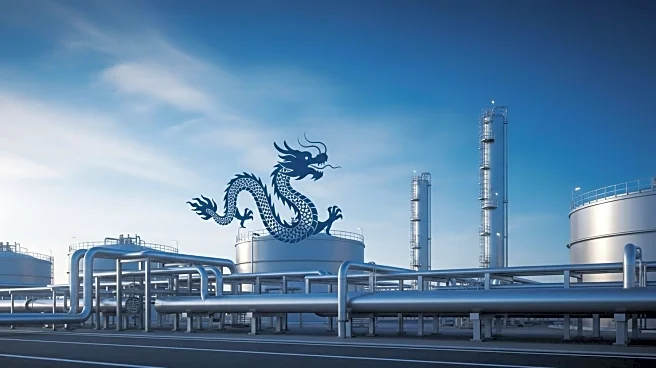What's Happening?
Russia's Arctic LNG 2 plant, operated by Novatek, is continuing its operations despite Western sanctions imposed following Russia's invasion of Ukraine. The plant, located in the Siberian Arctic, has been able to maintain its output with significant assistance from Chinese interests. China's government, through state-owned enterprises, holds a 20 percent stake in the project, and Chinese gas companies are currently the sole customers, attracted by discounted prices. The plant recently achieved a record average of 18 million cubic meters of gas liquefaction per day in September, although this surge may be temporary as the winter ice season approaches. The plant's operations have been challenged by export bans on key parts from Western suppliers, delaying the installation of its second train until recently.
Why It's Important?
The continued operation of the Arctic LNG 2 plant highlights the geopolitical complexities surrounding energy production and trade. Despite Western sanctions aimed at curbing Russia's economic capabilities, the involvement of Chinese companies underscores the shifting alliances and economic dependencies in the global energy market. This development could potentially weaken the impact of sanctions and alter the dynamics of international energy supply, particularly in Asia. The situation also reflects the broader implications of geopolitical tensions on global trade and energy security, as countries like China seek to secure energy resources amidst international conflicts.
What's Next?
As the winter ice season approaches, the Arctic LNG 2 plant may face operational challenges, potentially leading to a temporary shutdown. Novatek's plans to expand its shipping capabilities with a fleet of icebreaking LNG carriers have been stalled due to sanctions, affecting the plant's ability to maintain a consistent supply chain. The ongoing legal and contractual disputes with South Korean shipbuilder Samsung Heavy Industries further complicate the situation. The future of the plant's operations will likely depend on the resolution of these logistical and legal challenges, as well as the evolving geopolitical landscape.
Beyond the Headlines
The situation with the Arctic LNG 2 plant raises questions about the effectiveness of sanctions as a tool for international diplomacy and economic pressure. It also highlights the role of emerging economies like China in reshaping global energy markets and their potential to circumvent traditional Western economic influence. The environmental implications of increased Arctic shipping and energy production in sensitive ecological zones also warrant consideration, as they could have long-term impacts on the region's climate and biodiversity.










